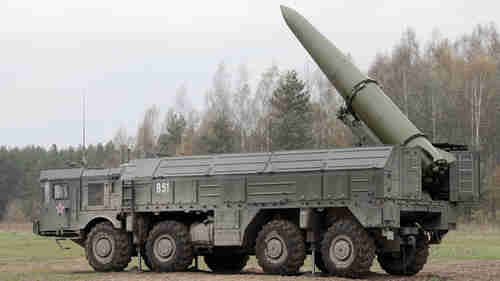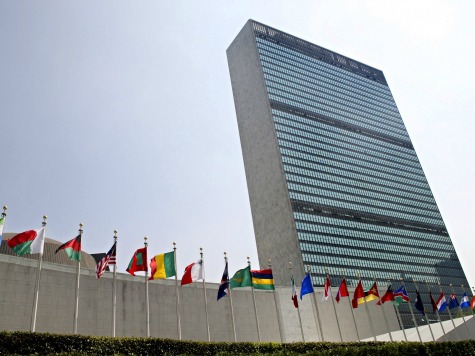 This morning’s key headlines from GenerationalDynamics.com
This morning’s key headlines from GenerationalDynamics.com
- No World View column yesterday
- Russia deploys nuclear capable missiles into occupied Crimea
- UN says nations should make saving migrants’ lives the highest priority
- Wall Street sell-off deepens as oil prices plummet
No World View column yesterday
Due to circumstances beyond my control, there was no World View columnyesterday. My apologies to anyone who was inconvenienced.
Russia deploys nuclear capable missiles into occupied Crimea

Iskander mobile missile system (Russia Today)
Russia is deploying nuclear capable Iskander missiles in Ukraine’sCrimea peninsula, which is occupied by Russia in violation ofinternational law, unapproved by the UN Security Council. Iskandersystems could be fitted with up to ten different types of warhead,including tactical nuclear warheads, which can be transported toCrimea in a matter of hours.
This is part of a project to build up Russia’s existing militaryinfrastructure in occupied Crimea, particularly associated with thebasing of its Black Sea Fleet, to extend its level of control in theBlack Sea region more broadly. Nato commander General PhilipBreedlove has expressed his concern about what he described asRussia’s “militarization of Crimea,” which received widespreadpublicity in Moscow. He also noted the increasing numbers of weaponsin Crimea and cruise missiles, which could affect the regionalmilitary balance.
Last year, Moscow confirmed the deployment of Iskander missiles inKaliningrad, on the border with Nato and the Baltic states. Combinedwith a deployment of the system to occupied Crimea, NATO’s easternflank is heavily exposed to the capabilities of the Iskander.Jamestown and Russia Today (16-Dec-2013)
UN says nations should make saving migrants’ lives the highest priority
UN human rights chief Antonio Guterres is calling many countriessaving migrants’ lives. According to Guterres:
This is a mistake, and precisely the wrong reactionfor an era in which record numbers of people are fleeing wars.Security and immigration management are concerns for any country,but policies must be designed in a way that human lives do not endup becoming collateral damage.
According to the UN, there have been at least a record-breaking348,000 “boat people” so far this year, migrants who risked travelingover water to go to another country:
- Europe, surrounded by the Libya, Ukraine and Syria/Iraq conflicts, had 207,000 sea arrivals, up from the last high of 70,000 in 2011. Half of the arrivals were from Syria and Eritrea.
- In the Horn of Africa region, 82,680 people crossed the Gulf of Aden and Red Sea mainly from Ethiopia and Somalia to Yemen and Saudi Arabia.
- In Southeast Asia, 54,000 people have crossed from Bangladesh or Myanmar, Thailand, Malaysia or Indonesia.
- In the Caribbean, at least 4,775 people crossed in search of asylum.
Related to the increasing flood of refugees are the unprecedentednumbers of countries in crisis. For the first time, the UN hasdeclared five “Level 3” humanitarian crises: West Africa (Ebola),Iraq, South Sudan, Syria, and the Central African Republic. Manycrises are centered in the Palestine region, with a population thatgrew from 600,000 a century ago to 12 million today — the most rapidpopulation growth in the world.
From the point of view of Generational Dynamics, there are manysimultaneous trends — population growth, increased food prices,increased nationalism, increased recklessness, increased fragility ofthe global economy — that are leading to a new world war in thecurrent generational crisis era. And to emphasize the point, the BBCis reporting that 5,000 people worldwide have been killed by jihadistattacks in November alone. Euro News and UN High Commissioner for Refugees and AFP
Wall Street sell-off deepens as oil prices plummet
As I wrote a couple of days ago, the Bank of International Settlementsis confirming the view that the wild swings in the stock market aresimilar to those that occurred just before the 1929 crash, and areextremely dangerous today. ( “8-Dec-14 World View — Bank of International Settlements warns of ‘fragile’ and ‘sensitive’ markets”)
Analysts are blaming the three-day sell-off in Wall Street stocks,capped on Wednesday with a fall of 268 points in the Dow JonesIndustrial Average, on a dramatic plunge in the price of oil. WestTexas Intermediate oil fell to $59 dollars a barrel on Wednesday,before closing at $61.21, and OPEC predicted reduced oil demand nextyear, suggesting that oil prices will go a lot lower. It’s thoughtthat the plunge in oil prices is a proxy for slowing economies inEurope and Asia.
According to one analyst I heard on Wednesday, this is a “globalmargin call.” 15 of the 20 largest sovereign wealth funds get theirmoney from oil, and now they’re being forced to sell their assets astheir oil-linked investments plummet in value. As with anybroad-based margin call, this is causing a chain reaction that’saffecting markets around the world.
The S&P 500 Price/Earnings ratio (stock valuation index) is above 19,which is astronomically higher than the historic average of 14. Thisindicates that the stock market is in a huge bubble which, like allbubbles, has to implode at some point. From the point of view ofGenerational Dynamics, this could happen at any time. It remains tobe seen whether the current round of volatility settles down.
KEYS: Generational Dynamics, Russia, Ukraine, Crimea, Iskander,Black Sea, Nato, Philip Breedlove,UN High Commissioner for Refugees, Antonio Guterres,West Africa, Iraq, South Sudan, Syria, Central African Republic,OPEC, oil prices
Permanent web link to this article
Receive daily World View columns by e-mail

COMMENTS
Please let us know if you're having issues with commenting.